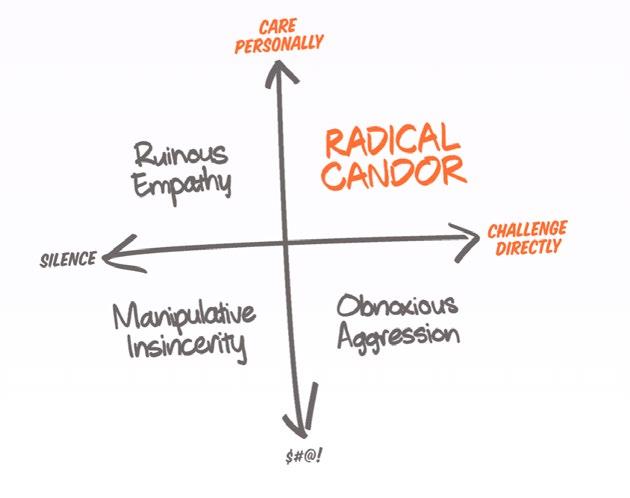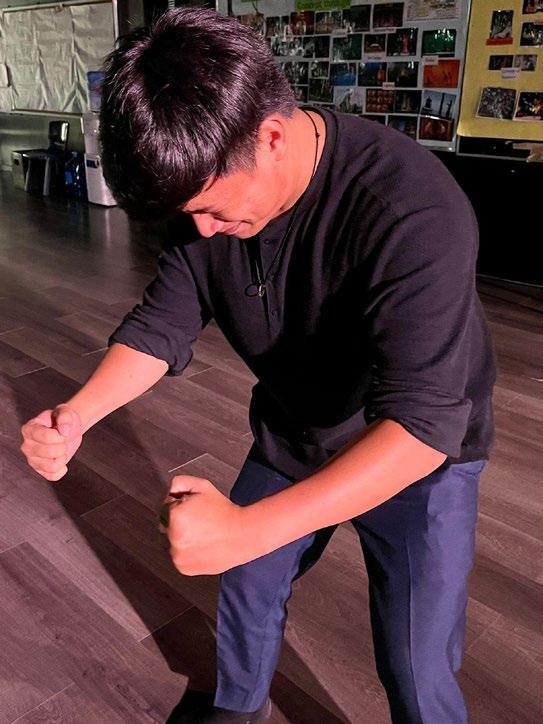
4 minute read
Radical Candor in Self-Reflections
By Lizzie Hodge
How can Radical Candor help lead your students to more honest and in-depth reflections?
Advertisement
As a team of learning leaders (otherwise known as heads of department), we often look into current theories and management/pedagogical approaches that may positively impact our teaching and learning experience. One approach that has sparked an interest in me and how it might be used as a way to reflect on a creative process is Kim Scott’s ‘Radical Candor’. There is a plethora of information out there on this theory and I do not pretend to be an expert, but simply put, Radical Candor is ‘Caring Personally while Challenging Directly’.
It is a method of giving guidance and feedback that is both kind and clear, specific and sincere. ‘Caring personally’ being the humanity, human relationships, love for each other etc. In IB terms - caring. ‘Challenging Directly’ being the ‘willingness to piss people off’ as Scott puts it, or IB terms, perhaps being a risk taker? Ultimately, being open minded enough to receive the truth without being hurt or angry through skilled communication.
It was intended to be used as a management tool in navigating what can be sometimes awkward conversations with your team members, but the more I looked into this approach, the more I thought how useful this could be for students to use as a self reflecting tool - an honest conversation with themselves about themselves and their work. For the purpose of this article, I will focus on how I used this method for self-reflection, however, hopefully you will recognise how incredibly useful it can be in teaching students how to give constructive but kind feedback to their peers!
How often do we read journals where our students have either been way too harsh on themselves or perhaps offered an over inflated version of their work, not noticed or even missed out weaknesses and areas for growth/ improvement? I am always grappling with how to help my students to find that sweet balance between being kind to themselves but at the same time challenging themselves.
Below you will see a diagram Kim Scott uses to help explain Radical Candor and importantly, what it is not! I know none of these behaviours will be new to you, but I found that giving them a name really helped to focus the reflection/response. As Scott puts it, ‘think of it like a compass to help guide conversations’ and in this case, the conversation with themselves when reflecting on their work.
Radical Candour: Our Approach (webpage accessed 1st May 2022).
How I used this approach in class:
1. As a class activity, I showed the students this diagram and the descriptions below. I asked them to reflect on times when they may have experienced some of the characteristics below either in their own self reflections or when giving feedback to others. The purpose of this step is to understand/recognise these different behaviours. It is important to point out that you should warn your students not to name names - very tempting for them!
Obnoxious Aggression™ also called brutal honesty or front stabbing, is what happens when you challenge someone directly, but don’t show you care about them personally. It’s praise that doesn’t feel sincere or criticism and feedback that isn’t delivered kindly.

Ruinous Empathy™ is what happens when you want to spare someone’s short-term feelings, so you don’t tell them something they need to know. You Care Personally, but fail to Challenge Directly. It’s praise that isn’t specific enough to help the person understand what was good, or criticism that is sugar-coated and unclear. Or simply silence. Ruinous Empathy may feel nice or safe, but is ultimately unhelpful and even damaging. This is a feedback fail.






Manipulative Insincerity™
(backstabbing, political or passive-aggressive behaviour) is what happens when you neither Care Personally nor Challenge Directly. It’s praise that is insincere, flattery to a person’s face and harsh criticism behind their back. Often it’s a self-protective reaction to Obnoxious Aggression. This is the worst kind of feedback failure.
2. Once they had been given time to understand these different behaviours and reflected on when they had noticed these either in themselves or observed in others, we continued with our regular drama lesson. Note - keep the drama activity short as the main focus of this lesson is to practice reflecting with Radical Candor, so make sure to allow time for the steps below.
3. At the end of the lesson, I asked students to self-reflect on their work three times, through the lens of each of the behaviours above. I made it clear that this was to understand how NOT to self reflect! For example, ‘what kinds of things might you say or write if you were showing Ruinous Empathy behaviours?’ This could be done as a written exercise, a recorded voice note or a filmed response. Have some students share some of the responses with the class and have peers guess which behaviour they are showing. Again, the purpose here is to understand each of these behaviours.
Obnoxious Aggression:
‘Why am I such a coward?! I never have the guts to speak up! I’m so pathetic!’
Ruinous Empathy: ‘I think I am a great collaborator because I always support my group’s ideas. I follow their instructions well and I do as they tell me’
Manipulative Insecurity: What is said: ‘I thought I did well at listening to my teammates’
What is actually thought: ‘OK yeah, listening, but what ideas did I actually contribute? None!’

4. After each example had been shared a class discussion was had about what they understood to be the negative impact of each of these behaviours on their work and progress.
5. Next I mapped a line across the whole room. At one end was Caring and at the other was Challenging. I asked the students to think about how they self reflect and where they were on the line - are you too harsh on yourself or missing out what you are doing well at? Are you focussing too much on your strengths and not giving enough time to thinking about where you could do better? What do you need to consider to be able to place yourself in the centre of this line?
6. Next I asked them to try again, this time using the Radical Candor approach.
7. To finish, we discussed why it is important to keep the balance between caring and challenging and how this balance might help us to grow and improve.
Final thoughts:
I know we can’t often spend entire lessons teaching reflection skills all the time as we have units to complete and work to rehearse etc, but I really felt this was a worth while lesson and one with a lasting impact. I am interested to see how this lesson will impact how students talk to each other too.
Here are some video resources to learn more about Radical Candor:
Radical Candor In 6 Minutes With Kim Scott
Kim Scott: How to be kick-ass boss
Radical Candor - The Surprising Secret to Being a Good Boss










